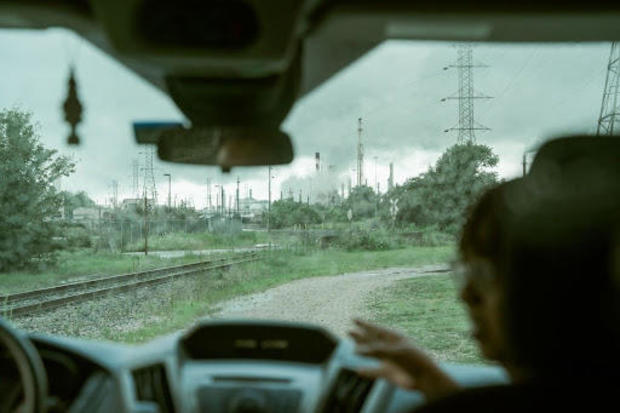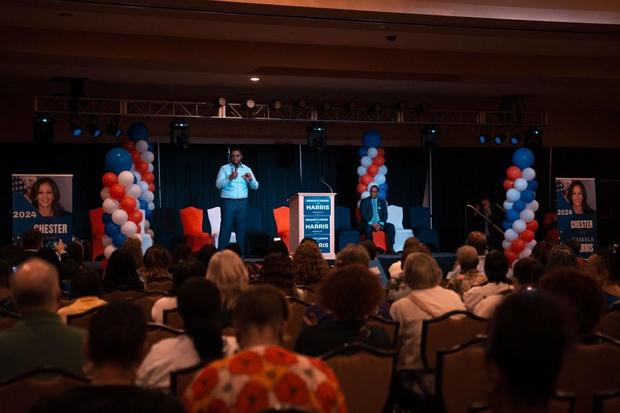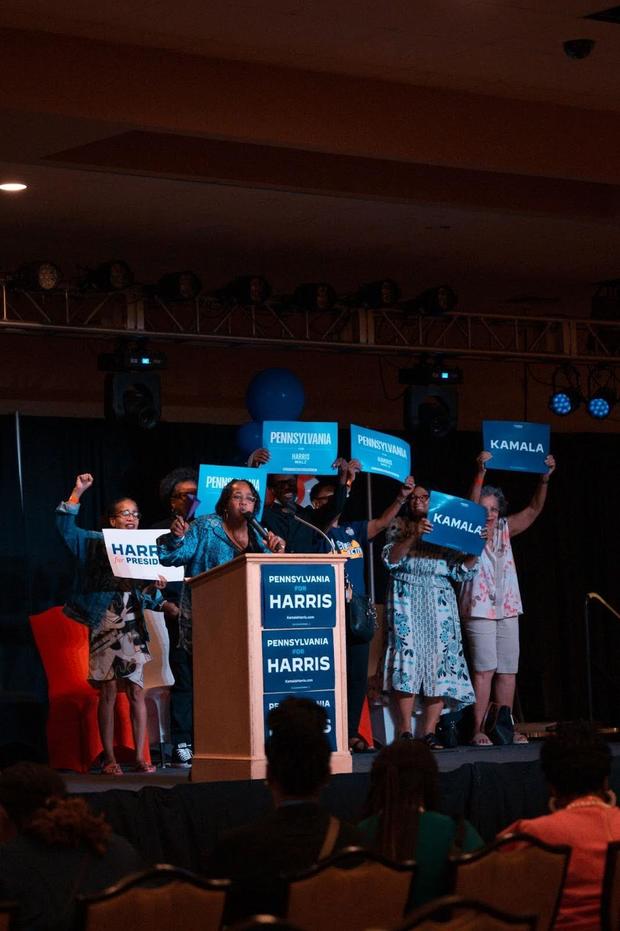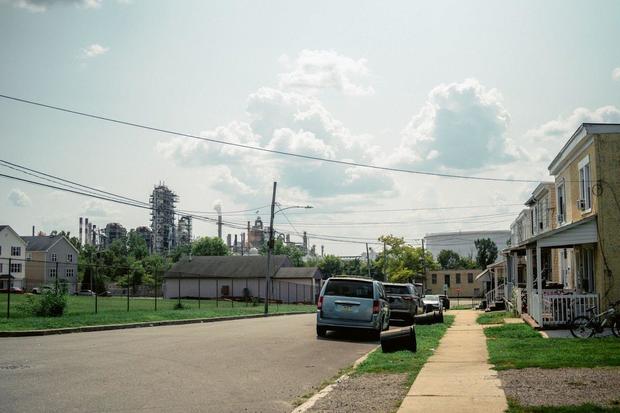
Can the Harris Walz campaign get voter turnout in a Pennsylvania environmental justice community affected by natural gas?
Chester, Pennsylvania — At a recent Harris-Walz campaign rally in Chester, environmental advocate Zulene Mayfield called for action from the crowd of a few hundred residents.
“We are the masters of our fate,” she said, urging them “to mobilize this community in a way that has never happened.”
Chester is what climate activists call an “environmental justice community,” a place where climate change and pollution disproportionately affect underserved populations. A 1995 EPA study found levels of lead in blood and cancer risks in the city to be “exceedingly high” and its rate of childhood asthma 20% higher than the national average. Chester is also over 75% Black.
CBS News
For decades most Chester residents have regularly protested in the hundreds in public forums against the expansion of heavy industries, particularly fracking and others involving fossil fuels, which they believe have negatively affected their health without providing much of an economic benefit.
43% — far behind the 66% who voted nationwide in that election.
Mayor Stefan Roots, who grew up in Chester, remembers taking the ferry and being mesmerized by the rainbows in the water. Years later, he realized the bright colors were caused by oil slicks.
At night from his bedroom window, he says he’d look west and watch the flares from the oil refineries, a sight that scared him.
“Why is it that you have those big industries, those big companies, and the city still doesn’t seem to benefit from it?” he told CBS News. “You can see around the country that these polluting industries seem to land on or close to Black and Brown communities. That’s racism.”
CBS News
Chester, a city of 33,000 just outside Philadelphia, is the oldest city in the state, incorporated in 1682. Once a steel and textile manufacturing hub, it peaked as an industrial base in the mid-20th century but suffered as factories and businesses closed in the 1960s. In the years since, Chester’s tax base has shrunk and its pensions face a $40 million shortfall. In 2020, it was put into receivership and, two years later, declared bankrupt.
Chester relies primarily on a casino, a trash incinerator and a sewage incinerator for revenue. Petroleum pipelines and rail lines crisscross the area and just outside the city limits are several oil refineries and the Marcus Hook Industrial Complex, which houses a natural gas storage and export facility. Homes are built right next to several of these facilities.
Voters here want to see federal funding through Biden administration climate grants continue under Harris for job training in green industries, and they’re calling for improvements in public health and city services including education and beautification. Many fear that a Trump administration would cancel the existing, and more businesses that cause pollution would be approved.
“I’m really concerned about the environment and moving the city forward in terms of making it a quality place where all can live,” educator Thom Nixon told CBS News. “We should be able to have freedom and air and water to breathe, and not be victims of environmental justice just because of our zip code, and just because some of our people are, are struggling economically.”
Roots thinks younger and older voters may turn out but not those who are 30 to 50 years of age.
“They feel as though ‘when I do speak up, no one listens, nothing changes,’ so they just sit back and they sit back and watch,” he said.
Pennsylvania Democrats disappointed many Chester residents with their comments on Liquified Natural Gas after a proposal to install a liquified natural gas terminal in the city in 2022, the latest development in the city’s battles with 11 industries, with some emitting tens of thousands of pollutants.
In January, the Biden administration paused new approvals of Liquefied Natural Gas terminals. Chester residents applauded the decision, hoping it would prevent the LNG terminal from being built on the city’s waterfront. But the commonwealth’s Democratic U.S. Senators, John Fetterman and Bob Casey, and Gov. Josh Shapiro opposed the administration’s decision.
The senators cited concerns over its effect on natural gas industry jobs and energy independence in a joint statement. Shapiro told Bloomberg and the Financial Times that he hopes the pause is brief, emphasizing that natural gas is “critically important” to the state.
“Fetterman will not get my vote the next time because of this,” Nixon, 57, told CBS News, adding he felt the same about Shapiro.
“This is not even for our community,” he said. “Those two people, they haven’t even come down and sat down and talked to us and even asked us how we feel about this, as a small city that’s going to take all the burden.”
On July 1, the administration’s LNG pause was overturned by a U.S. district judge in Louisiana. Harris and her campaign have not weighed in on approving new LNG facilities. As a 2020 presidential candidate, Harris vowed to end fracking but since launching her campaign, she has said she would not ban fracking.
“As vice president, I did not ban fracking, as president I will not ban fracking,” she told CNN.
The Trump campaign has promised to approve new natural gas infrastructure, including approving LNG facilities. “Drill, baby, drill,” former President Donald Trump often says during his campaign speeches, echoing former GOP vice president nominee Sarah Palin, who made the phrase famous in 2008.
Residents like James Harper Jr., a business manager at Laborers’ Local 413 who grew up in Chester and has a son with asthma, see natural gas as a “catch-22.” His main priority in this election is jobs for his members, but having grown up in Chester, he believes the safety of his members and community needs to be a focus, too.
“We want certainly to build — that’s our bread and butter,” he said. “I would love for it to be something else.”
For Mayfield, LNG is just the latest in a string of environmental injustices, like the trash incinerator built in front of her house.
Mayfield was excited at first to hear about the LNG pause by the Biden administration, but her excitement quickly waned.
“I took a breath and reality set in. This is an election year,” she said. “This is politics.”
CBS News
She felt that Mr. Biden, who was then running for reelection, was just trying “to shore up his base in the Black communities.”
But despite the disappointment in Pennsylvania Democrats and the administration, Mayfield strongly supports Harris and discourages environmentalists from hurting Harris’ campaign, saying communities on the frontline like hers can’t afford to lose or weaken sympathetic allies.
“Of course, nobody gets everything they want,” she said. “Our position will be stronger if we help them get into office.”
Her primary mission is turning the hundreds who attended the rally into 7,000 plus votes, given that in her view, the alternative is grim.
“I see no help coming from the Trump administration for my community,” she said. “I’m not going to prepare a list of demands for Kamala, I’m doing none of that.
Roland Taylor, 48, an entrepreneur who owns a tax business and a restaurant in downtown Chester, grew up in the area and hopes to rejuvenate and bring more life into its downtown. The economy and pollution are his top two issues, and Taylor says they are interconnected.
“My mother died of cancer, my father died, they all died premature deaths,” Taylor told CBS News. “Us developing our neighborhoods, us combating the blight, shows that we’re much more than a dumping site.”
But as politicians have come and gone, Taylor has come to feel that he and about a dozen grassroots community members have done more for Chester than any elected official.
“At some point, I also feel like a fool just being loyal to the Democrat,” he told CBS News. “I feel like I’ve done more than them — why am I so loyal to them?”
CBS News
But for many Chester residents, the connection between the environment and their futures is clear. Potentially millions of dollars in grant money from the Inflation Reduction Act’s Justice40 initiative is also on the line for cities like Chester. Justice40 is a federal goal to ensure 40% of the benefits of the act reach disadvantaged communities.
Roots fears that under a Trump administration, funding for communities like Chester would not exist.
The city is applying for Environmental Protection Agency grant money that it hopes to use to improve children’s health through lead testing, beautify the city and enable residents to make home improvements and pursue vocational training for sustainable jobs.
“It’s almost like the New Deal,” Roots told CBS News.
Source: cbsnews.com


